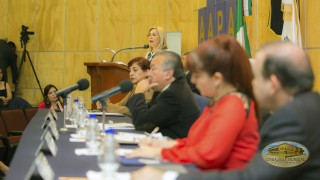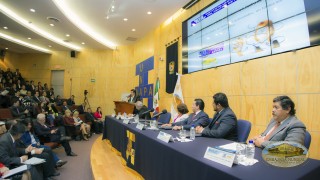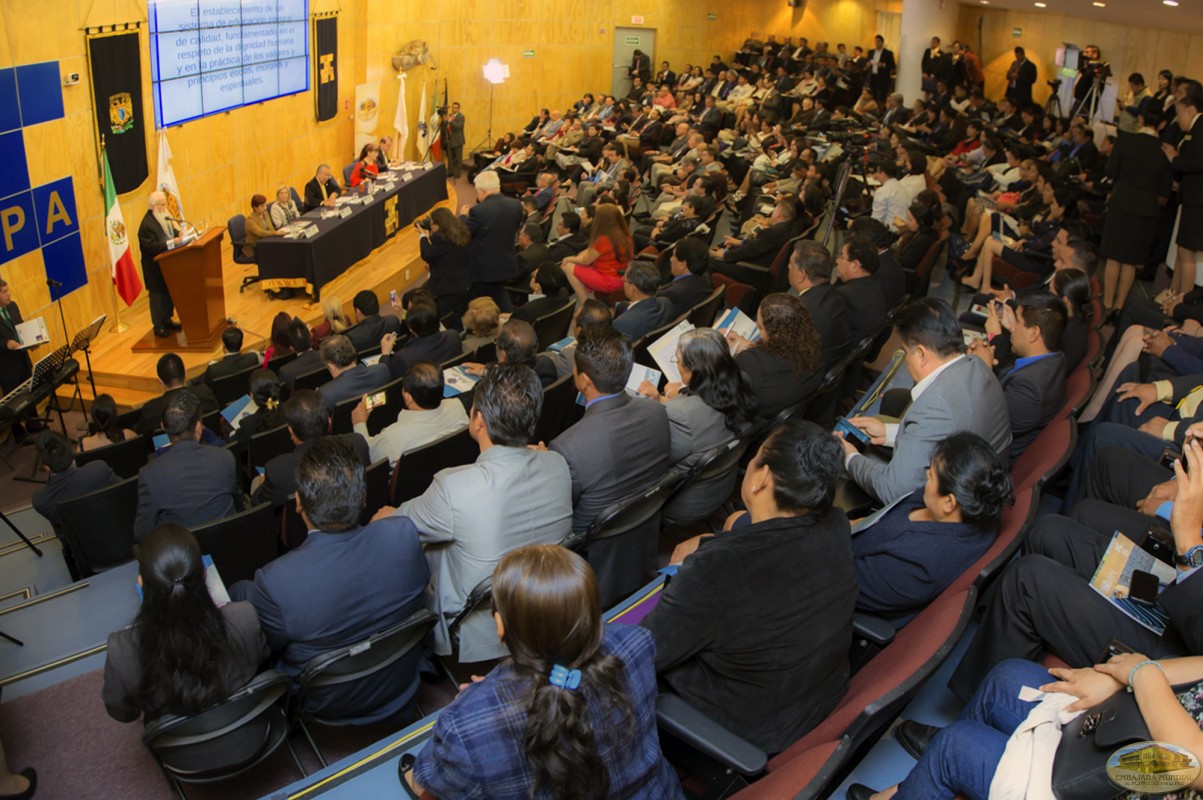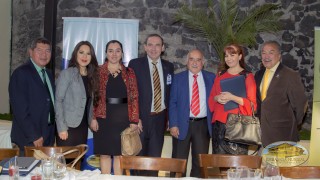At the headquarters of the Autonomous Association of the Academic Personnel of the UNAM, more than seventy institutions of Higher Education, represented by rectors and directives, gathered at the FIRST NATIONAL ENCOUNTER OF UNIVERSITIES AND INSTITUTES OF HIGHER EDUCATION INCORPORATED WITH THE ALIUP, INTENSIFIED THE COMMITMENT TO EDUCATE FOR PEACE AND TOWARDS PEACE (ALIUP) this past March 16th.
The educational institutes convened by the Global Embassy of Activists for Peace (GEAP) and the National Autonomous University of Mexico (UNAM), spoke from the construction of a culture of peace through education, reaffirming the work that has been carried out in Mexico, where there are already approximately twenty national seminars in various universities in the country.
Doctor Angel Olivo, Secretary for Academic Affairs of the Executive Committee of the AAPAUNAM, was present at the act, who gave the opening and welcoming remarks at the encounter:
“This is your house. The AAPAUNAM is characterized by its motto, which is: the ideological pluralism, essence of the university. Be welcome and with the best wishes, may this marathon be fruitful for Peace.”

The Pro Tempore Secretary of the ALIUP, represented by Dr. Hermalinda Alvarenga de Ortega, presented an executive report where she mentioned the international seminars carried out in Paraguay, Colombia, Argentina, Venezuela, and Mexico, and made reference to the participation of the Academy in CUMIPAZ 2015. She concluded her intervention with the summary of the strategic fields of action to apply at an institutional, educational, in the area of investigation, university extension levels, and the university contest of action projects for peace, manifesting that these fields compromise members of the network for a work analysis and reflection within what she called “a laboratory of Higher Education.”
The objectives and priorities of Higher Education are promoted through actions that include new paradigms in an integral education

The Executive President of the GEAP, marked the beginning of interventions and focused his dissertation on the need for a paradigm change in Higher Education, on the other part, showed the importance that the university assumes its responsibility as a trainer of integral professionals, to be sensitized leaders with their environment and that positively impact society. Among other things, he spoke about the need for the internationalization of Higher Education demanding actions of a system of quality integral education, based on respect for human dignity and the practice of ethical, moral and spiritual values and principles.
“We cannot act as separated nations, as independent universities; the university has a very important role because it prepares more human, more sensitive and supportive leaders, not only for a region but for the world. In ALIUP we will join forces and enrich the process of integral formation of the human being.” Dr. William Soto Santiago.
For his part, the national coordinator of the GEAP in Mexico, Dr. Francisco Guerra, outlined the objectives of the programs and projects promoted by the Institution, emphasizing the important participation of students in each of them, as part of the actions of the university extension.

The development of the event took place in two dialogue tables; ten distinguished educational, private and governmental institutions shared their expectations and contributions in favor of a culture of peace.
“The way to achieve a culture of peace is education for peace, which includes education in human rights. It is a matter of educating to learn to live together and to learn to reconcile with nature (…) it is, colleagues, about a formal and non-formal education that achieves the internalization of this objective.” Dr. Rebeca Amador, Director of NGO Linkage of the National Human Rights Commission.
“It is not only to prevent violence, it is providing spaces of peace; not only do I remove violence or only stop it and denounce it, but it is to provide spaces of peace that build a new way of relating.” Dr. Gloria Maria Abarca, coordinator of the Peace Center.
“We have two treasures, students are one of them and the other are professors; they are a binomial that should not be separated in a process of professional training.” Maestro Victor Manuel Gonzalez, academic sub director of UPIICSA.
“The university community must motivate the right to human dignity through a methodology research, using collective reflection based on the analysis of the events that occurred in the Holocaust.” Dr. Maria Concepcion Flores, Rector of the Polytechnic University of Veracruz.
The pedagogical approaches for the knowledge and practice of universal principles and values in the process of the formation of students, values and democracy, peace and the Holocaust, were some of the topics spoken by the lecturers, who at the same time proposed a teaching of ambassadors for peace.
In pursuit of these peace goals, the ALIUP in the globalized world will promote the strengthening of justice, respect for the planet Earth, the love of life, and will facilitate the construction of an education for peace in the integral human being.


